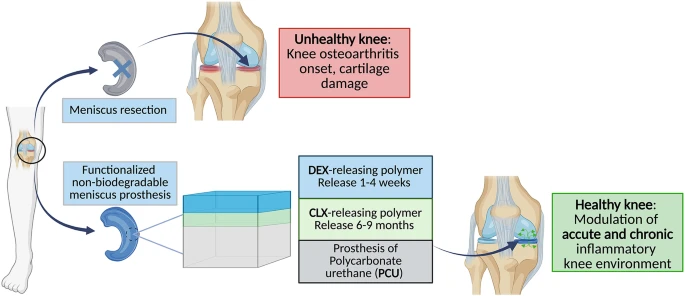- Publication: Blanco, A.F., Lou, G., Pensado-López, A. et al. Controlled co-delivery of anti-inflammatory drugs from bilayer polymer films coating a meniscus implant. Drug Deliv. and Transl. Res. (2025). https://doi.org/10.1007/s13346-025-01942-5
ABSTRACT:
Knee osteoarthritis (OA), a degenerative joint disease, is increasingly prevalent worldwide and often results from a meniscal deterioration that leads to meniscus removal. Replacing the damaged meniscus with a non-biodegradable prosthesis offers an innovative solution to prevent OA progression, particularly in older patients. However, the long-term use of anti-inflammatory drugs for pain relief and prosthesis integration can cause severe off-target side effects. The objective of this work was to design and develop drug-loaded bilayer polymer films to be used as coatings for a meniscus polycarbonate urethane (PCU). The developed bilayer polymer films enabled a sustained release of two anti-inflammatory drugs – dexamethasone (DEX) and celecoxib (CLX) – with distinct release kinetics (1–4 weeks for DEX and 6–9 months for CLX). This release profile was defined to modulate post-surgical and chronic inflammation within the knee joint, respectively. Two bilayer prototypes showed consistent biodegradation, drug release, drug loading, and reproducibility. Furthermore, the systems were sterile, biocompatible, and maintained the anti-inflammatory efficacy of the released drugs, effectively reducing pro-inflammatory cytokine secretion from human primary macrophages.
